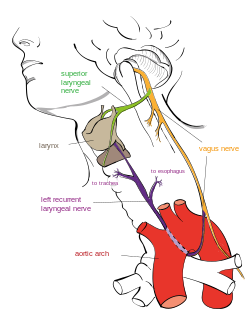Tucker syndrome

Editor-In-Chief: Prab R Tumpati, MD
Obesity, Sleep & Internal medicine
Founder, WikiMD Wellnesspedia &
W8MD's medical weight loss NYC, sleep center NYC
Philadelphia medical weight loss and Philadelphia sleep clinics
| Tucker syndrome | |
|---|---|

| |
| Synonyms | N/A |
| Pronounce | N/A |
| Specialty | N/A |
| Symptoms | Hoarseness, dysphagia, stridor |
| Complications | Respiratory distress, aspiration pneumonia |
| Onset | Congenital or acquired |
| Duration | Chronic |
| Types | N/A |
| Causes | Genetic mutation, trauma, surgery |
| Risks | Family history, neck surgery |
| Diagnosis | Laryngoscopy, CT scan, genetic testing |
| Differential diagnosis | Vocal cord paralysis, laryngeal cancer |
| Prevention | Avoidance of neck trauma, genetic counseling |
| Treatment | Speech therapy, surgical intervention |
| Medication | Corticosteroids, antibiotics |
| Prognosis | Variable, depending on severity |
| Frequency | Rare |
| Deaths | N/A |
A rare neurological disorder affecting the recurrent laryngeal nerve
Tucker syndrome is a rare neurological disorder characterized by dysfunction of the recurrent laryngeal nerve, which can lead to vocal cord paralysis and other associated symptoms. This condition is named after the physician who first described it.
Pathophysiology[edit]
The recurrent laryngeal nerve is a branch of the vagus nerve that supplies motor function and sensation to the larynx. In Tucker syndrome, this nerve is affected, leading to impaired movement of the vocal cords. The exact etiology of the nerve dysfunction in Tucker syndrome is not well understood, but it may involve genetic, autoimmune, or idiopathic factors.
Clinical Presentation[edit]
Patients with Tucker syndrome typically present with symptoms related to vocal cord paralysis, including:
The severity of symptoms can vary depending on the extent of nerve involvement and whether one or both vocal cords are affected.
Diagnosis[edit]
The diagnosis of Tucker syndrome is primarily clinical, based on the characteristic symptoms and the exclusion of other causes of recurrent laryngeal nerve palsy. Diagnostic tools may include:
- Laryngoscopy to visualize vocal cord movement
- Electromyography (EMG) to assess nerve function
- Imaging studies such as MRI or CT scan to rule out structural causes
Management[edit]
Treatment of Tucker syndrome focuses on managing symptoms and improving quality of life. Options may include:
- Voice therapy with a speech-language pathologist
- Surgical interventions such as medialization thyroplasty
- Use of botulinum toxin injections to reduce muscle spasms
Prognosis[edit]
The prognosis for individuals with Tucker syndrome varies. Some patients may experience spontaneous recovery of nerve function, while others may have persistent symptoms requiring ongoing management.
See Also[edit]
Ad. Transform your life with W8MD's Budget GLP-1 injections from $75


W8MD offers a medical weight loss program to lose weight in Philadelphia. Our physician-supervised medical weight loss provides:
- Weight loss injections in NYC (generic and brand names):
- Zepbound / Mounjaro, Wegovy / Ozempic, Saxenda
- Most insurances accepted or discounted self-pay rates. We will obtain insurance prior authorizations if needed.
- Generic GLP1 weight loss injections from $75 for the starting dose.
- Also offer prescription weight loss medications including Phentermine, Qsymia, Diethylpropion, Contrave etc.
NYC weight loss doctor appointmentsNYC weight loss doctor appointments
Start your NYC weight loss journey today at our NYC medical weight loss and Philadelphia medical weight loss clinics.
- Call 718-946-5500 to lose weight in NYC or for medical weight loss in Philadelphia 215-676-2334.
- Tags:NYC medical weight loss, Philadelphia lose weight Zepbound NYC, Budget GLP1 weight loss injections, Wegovy Philadelphia, Wegovy NYC, Philadelphia medical weight loss, Brookly weight loss and Wegovy NYC
|
WikiMD's Wellness Encyclopedia |
| Let Food Be Thy Medicine Medicine Thy Food - Hippocrates |
Medical Disclaimer: WikiMD is not a substitute for professional medical advice. The information on WikiMD is provided as an information resource only, may be incorrect, outdated or misleading, and is not to be used or relied on for any diagnostic or treatment purposes. Please consult your health care provider before making any healthcare decisions or for guidance about a specific medical condition. WikiMD expressly disclaims responsibility, and shall have no liability, for any damages, loss, injury, or liability whatsoever suffered as a result of your reliance on the information contained in this site. By visiting this site you agree to the foregoing terms and conditions, which may from time to time be changed or supplemented by WikiMD. If you do not agree to the foregoing terms and conditions, you should not enter or use this site. See full disclaimer.
Credits:Most images are courtesy of Wikimedia commons, and templates, categories Wikipedia, licensed under CC BY SA or similar.
Translate this page: - East Asian
中文,
日本,
한국어,
South Asian
हिन्दी,
தமிழ்,
తెలుగు,
Urdu,
ಕನ್ನಡ,
Southeast Asian
Indonesian,
Vietnamese,
Thai,
မြန်မာဘာသာ,
বাংলা
European
español,
Deutsch,
français,
Greek,
português do Brasil,
polski,
română,
русский,
Nederlands,
norsk,
svenska,
suomi,
Italian
Middle Eastern & African
عربى,
Turkish,
Persian,
Hebrew,
Afrikaans,
isiZulu,
Kiswahili,
Other
Bulgarian,
Hungarian,
Czech,
Swedish,
മലയാളം,
मराठी,
ਪੰਜਾਬੀ,
ગુજરાતી,
Portuguese,
Ukrainian